Study, Travel, and Live Abroad in Chiang Mai, Thailand
A Rewarding but Difficult Experience
Article and photos by Kasey Weber
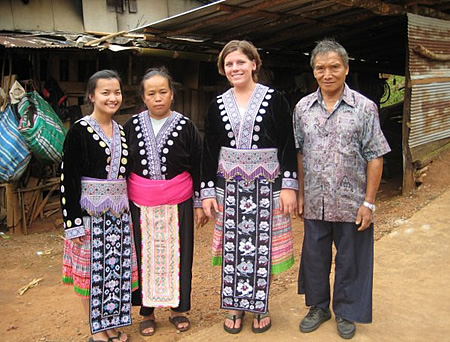
|
|
Author in Chiang Mai, Thailand with her host family.
|
As a college student nearing graduation, I reflected on all I had accomplished and experienced during my four years at the University of Wisconsin-Eau Claire. Was there anything that I still wanted to do? Studying abroad has always been recommended to me as a great opportunity. Students told me it was a lifetime experience — something you would never forget. I did not know how right they were until I put my fears aside and took the plunge into a study abroad experience. Up to that point, I had always been a person who preferred to have a friend with me — or at least someone I knew — when diving into something new. However, studying abroad would not have been such a growing experience had I not explored it alone.
I traveled to Chiang Mai, Thailand, for six weeks with the University of Wisconsin-Eau Claire's summer study abroad program.
Preparation and Advice for Studying Abroad
First, you should be bold and use the resources available at your University or via the program you are traveling through. They have done this before and generally provide plenty of valuable information. When I went to the orientation at my University, I thought, "That's silly" or "I don't need to do that." But had I listened to them, I would have had a copy of my check card when it was eaten by the ATM machine in Thailand and could have gotten it back!
I strongly urge anyone to participate in an overseas experience through an internship or study abroad. As I learned, you do not need a bubbling, energetic, or outgoing personality to have a life-changing experience. You only need the courage to get out of your "comfort zone" and be willing to try anything once. Otherwise, you will never know what you are missing and probably never have the chance to try again.
The Decision to Study and Travel in Thailand
I chose to travel to Chiang Mai, Thailand and to study at Payap University for a 2-month stint during the summer. For first-time travelers, a summer program is perfect. More likely than not, you will be bitten by the travel bug and want to return for more. I chose to travel to Thailand because I wanted the experience to be unlike that in the United States. However, if you are apprehensive about the extreme change or language barrier, you can study abroad in a country such as England, which is culturally more similar to the United States — and you should still have a memorable experience.
Practical Advice for Travel and Living in Thailand
If you choose to travel to Thailand, you will be glad you did. But I want to share with you some advice that would have been helpful to know before I went:
Make sure you notify your bank and Credit Card Company before you leave. I made this mistake, which may be why my ATM card was destroyed. In Thailand, it is vital to have a check card. Thailand is a cash-driven society, and ATM machines are easy to find. Many places do not take credit cards or traveler's checks. Have a credit card for booking rooms in a hostel or buying bulk tickets. So, have a check card, credit card, and Thai baht handy. I suggest the Japanese yen if you fly from Japan to Thailand.
A toothbrush, small containers of toothpaste, deodorant, lotion, shampoo, conditioner, face wash, mouthwash, etc., and a change of clothes are good to have on the plane. Ensure you always have your boarding pass, passport, and form of identification on you. Some think they look stupid, but having an around-the-neck carrier to store them is helpful. Also, bring a dictionary covering the language of the country you visit. Only pack what you need to. You can do laundry there. It is cumbersome to carry more than you can handle. In train stations, there are no elevators and often no escalators. So, packing light is essential to make travel more pleasant.
Make sure you study the area you are going to, see a travel nurse, and only get the shots needed for that area. A nurse might try to poke you with every type of shot in the book that you do not need. You should not need Japanese encephalitis, but typhoid is recommended, as is malaria if you go to the Northern region of Thailand (see the CDC Thailand website for more.).
In Thailand, I felt a huge culture shock when I went to the bathroom, and there was no toilet paper with just a hose in its place. Yes, it is for spraying you off. Toilet paper is something other than what you would think of to carry around with you. But it is something you desperately need. Also, hand sanitizer is helpful because you must visit a very upscale establishment to find soap.
For women reading this, ensure you bring feminine products with you. In Thailand, they do not have tampons and very few pads, so it's slim pickings if you do not have any or run out.
I cannot stress enough the importance of learning as much of the language as you can. You will go far with even "hello," "how are you," and "thank you." Thai people will respect you more, and you will not be treated poorly for being a furang or tourist/foreigner. Do not be discouraged when you begin speaking and are looked at differently, pointed at, laughed at, or called names; once you are accepted, they are some of the kindest people. When you do not know the language or understand it very little, a smile goes a long way. Also, education goes a long way. When Thais think you are a naive tourist or foreigner, some will try to take advantage of you. But they will appreciate and respect you if you smile, wear a school uniform, or even attempt to say one word in Thai.
Leave your expectations behind in your home country. Exploration of this new and vibrant culture is the part that will amaze, wow, frustrate, and open your mind. Try everything, and I mean everything! I know squatter toilets, beef intestines, fried grasshopper, freshly killed chicken, or a 5-hour hike may not seem appealing to some, but how do you know until you try them? Fried grasshopper is actually very tasty!
Branch out socially. You will only experience something if you talk to other Americans or people who speak English. I lived in an international dorm. I met students from Japan, Korea, France, Germany, Romania, Vietnam, and Thailand. This allowed me to practice my Thai and meet people I still know.
Keep your eyes and mind open to opportunity — everything is an adventure, no matter how ordinary. Everywhere I looked, there was a funny sign, a new fruit to try, an animal to see, or a song to hear. You may lose a great photo opportunity without being alert and paying attention.
Be aware of your non-verbal communication, tone of voice, and actions. You do not want to give a wrong idea or impression. Sometimes, this is the only way that Thai people will be able to know what you are saying. If you are saying something nice but with a scowl, they might misinterpret that you are saying something with mean intent.
Beware of animals; Thailand has no pounds or humane associations to take in stray animals, so they roam the streets. You do not know which animals have diseases. So, no matter how cute they may be, please do not play with them. This is especially the case with puppies; wild dogs are very protective of their puppies and will bite. If you get a bite, go to the hospital immediately to check it out.
You are expected to bargain at markets in Thailand. The markets offer some of the most beautiful homemade silks and other crafts, but no price is listed on each item. It is therefore accepted and expected that you go back and forth with them on the price. Some merchants are more willing than others to barter, and some will "harp" on you to get you to buy something at the price they have set. Sometimes, walking away is the best idea, as merchants will often quickly offer to decrease the price.
Monks are an integral part of Thai culture and cannot be touched by women. They wear orange so they can be spotted — so you do not have to worry about not recognizing them. No touching means not sitting next to them on a bus either — an American girl proceeded to sit next to a monk for a 2-hour bus ride, and I thought the monk would faint as he was so scared.
In Thailand, the utmost respect is given to the King and Queen. The King's face is on the currency, and his picture is all over the country. At 6 p.m. every evening, they play a song for the King, and you must stand up and be silent and still. The song also is played when you go to a theater, movie, or puppet performance. You will feel and look stupid and disrespectful if you keep walking and talking during his song. I know because it happened to me.
Beware of the heat in Thailand. I traveled to Thailand during America's summer and Thailand's rainy season. There were times when it was sweltering. Make sure you drink plenty of water. You will hear differing opinions about whether you should drink tap water. I did, but it did not taste terrific. I suggest bottled water, which costs only 5-10 baht (15-30 cents).
Many school programs suggest that you dress modestly. T-shirts and long pants are appropriate, so I packed them according to my school's recommendations. You do not want to represent your country wearing something that does not cover you appropriately for Thai culture. Sleeveless ribbed tank tops and capris are modest clothes that do not make you overly uncomfortable. Most schools have uniforms if you go to Thailand for school. Mine was a black skirt, a white button-down shirt, and black shoes.
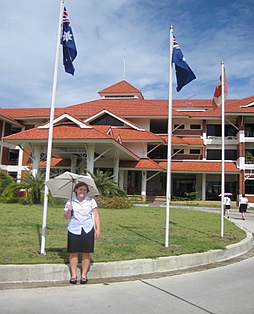
|
|
Payap University as a student in uniform.
|
When you go out to enjoy the nightlife, you will find that many Thais dress in a manner quite similar to Americans. Use your discretion. I would suggest bringing plenty of clothes with you; a lot of Thai clothes are one size fits all — which, in fact, is not the case. It is challenging to find clothes that work if you are larger than a size 6 — as am I.
There are two primary forms of public transportation to get around Chiang Mai: tuk-tuks and Song-taews. Tuk-tuks have both advantages and disadvantages. First, a tuk-tuk is a three-wheeled, window-less hybrid between a motorcycle and a taxi. The benefits of taking tuk-tuks are their inexpensive prices and their convenience. Fares must be negotiated, so agree on a price before starting a journey. If a price cannot be agreed upon, find another ride, as plenty are available. The main problem with riding a tuk-tuk is that breathing in car fumes is unavoidable. Song-taews are covered, long-bed trucks outfitted with seats to carry passengers. The red Song-taews are cheaper than tuk-tuks, costing 15 baht per person to go almost anywhere in the city. However, because they pick up new customers before dropping off their first customers, direct transportation to a destination may not be an option unless the driver is offered more money.
The first mistake I made in Thailand was commonly made by newcomers. If you are taking a taxi, negotiate a rate for the trip beforehand or ensure your driver turns the meter on. Many taxi drivers will "forget" to turn the meter on and charge you double what you should have been.
You are often warned to beware of roadside vendors. I recommend not avoiding them but using common sense when perusing their offerings. If there are flies on the food or if the food has a smell, obviously do not eat there. But during my stay in Thailand, I ate at roadside stands with fresh fruit and meat many times, and I found the fare to be some of the best and cheapest.
If you travel outside your family or dorm, take advantage of Thailand's hostels. They are very cheap and very clean. Hostelworld is an excellent site for finding affordable hostels. There are many different types of hostels, some good and some bad. Make sure you research them and check user ratings on the website.
Tour operators have set up many memorable treks that you can take for a day, weekend, or longer. They include waterfalls, elephant rides, whitewater rafting, hiking, and village stays. The hikes are long and hard but gorgeous and worth the effort. Many tour operators exist in Thailand or from international agencies. Be sure to research, compare, and investigate them all should you choose to go with one.
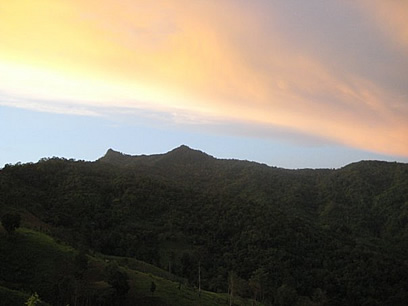
|
|
A landscape near Chiang Mai.
|
You want to avoid carrying your passport around with you everywhere. You will probably get a Thai identification card — whether it is for school or an internship. This gets you the Thai price instead of the "furang" price — usually three times as much. Ensure you always have a copy of your passport with you. Bring your passport when you decide to go on a weekend trip out of the area where you are staying. I would not have been able to go to Burma without my passport — and that was an experience!
There will be times when you ask yourself, "Why am I here?" or "What was I thinking?" and you will want to go home. There were several times when I felt pretty alone and out of place. I thought that I was a fat, ugly white girl among so many tiny, beautiful Thai girls. I did not know the language; it was hot, and all my friends enjoyed themselves back in Wisconsin. I am so glad that I did not listen to these thoughts, and I pushed on. Would I have been able to hold a baby tiger, ride an elephant, swim in a waterfall, or hike in the jungle in Wisconsin? You may only have these experiences once — seize and savor the moments!
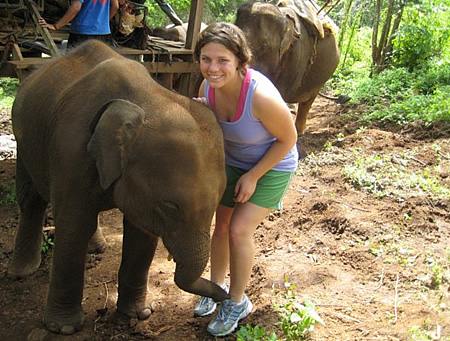
|
|
Meeting a baby elephant.
|
The best experience in Thailand is often a family homestay. If you can stay with a family, do not pass it up. The family homestay was, at times, difficult. I weeded rice paddies in hot fields for hours, did not know a word of the language, slept on a concrete floor, did not have access to hot water, and was awakened by a rooster at four, five, and six in the morning. But I was immersed in the culture and saw how the locals lived. Even though we hardly spoke a word to each other, my hosts were the friendliest and most welcoming people I have ever met. I did not want to leave when my homestay was over.
Overall, I had a memorable time in Thailand. I met some lifelong friends and enjoyed going to markets, trying new foods, staying late at fancy clubs, and singing karaoke in themed rooms. I hope you take the step to apply for a study abroad experience, which you will likely consider one of your life's highlights. These suggestions will help to make your study abroad experience go more smoothly. I made most of these mistakes myself and offered my advice so you avoid repeating them. But I know you will make some mistakes of your own adapting to life in a foreign culture, as it would not be an unforgettable and unique growth experience if you did not!
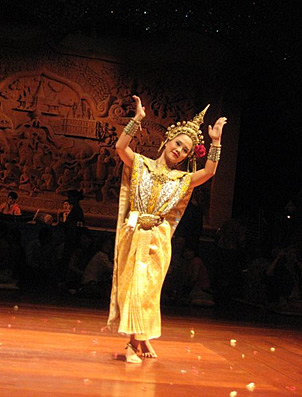
|
|
A Thai dancer.
|
Kasey Weber graduated with a Bachelor's Degree in Social Work with a minor in Gerontology. She hopes to work with the seniors, possibly in a Hospital or Nursing Home setting. Kasey works as a certified nursing assistant at a nursing home and provides in-home care for a 94-year-old woman. She is working these jobs until she starts her position teaching English to elementary school children in Japan. She will be in Japan for a year and hopes to return for a Master's Degree and find a Social Work position.
|
